Don't wanna be here? Send us removal request.
Text
How Metaverse Events Are Transforming Business Conferences & Expos
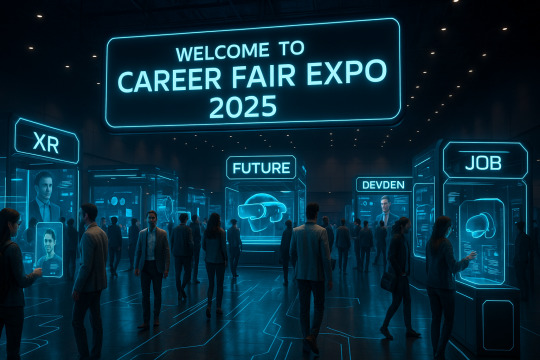
Virtual events are no longer limited to webinars and video calls. With the rise of metaverse development, business conferences and expos are entering a new era—where immersive, interactive, and global experiences take center stage.
From virtual networking halls to branded product pavilions, companies are adopting metaverse event solutions to connect with audiences in ways that feel both personal and cutting-edge.
What Makes Metaverse Events Different?
A metaverse event replicates and often enhances the experience of a physical event using a 3D virtual environment. Attendees join as avatars, walk through digital venues, interact in real time, attend live sessions, and explore booths just like they would at a physical event.
Unlike static platforms, the metaverse adds depth, movement, and realism turning passive attendees into active participants.
Why Businesses Are Shifting to Metaverse Event Solutions
1. Wider Reach, Lower Cost
Physical limitations no longer apply. Companies can host global events without travel, venue, or accommodation expenses, significantly increasing ROI and accessibility.
2. Custom-Branded Virtual Environments
Work with a metaverse development company to create a 3D venue that reflects your brand—from booth layouts to interactive product demos. This level of customization drives brand recall and deeper engagement.
3. Real-Time Interaction & Networking
Metaverse platforms support spontaneous conversations, one-on-one meetups, and breakout sessions—mimicking the fluidity of in-person networking.
4. Data That Matters
Track user behavior, heatmaps, session engagement, and booth visits to gain actionable insights—something traditional events can’t offer at the same depth.
5. Sustainable & Scalable
Reduce your environmental impact while reaching thousands. Virtual venues scale easily, whether you're hosting a niche seminar or a global tech expo.
Role of Metaverse Development in Event Success
Behind every successful virtual conference is a robust metaverse development strategy. Key components include:
Realistic and interactive 3D environments
Avatar creation and motion mapping
Seamless integration with livestreams and video conferencing tools
Gamification features to increase participation
Compatibility with VR headsets for immersive experiences
Choosing the right metaverse development company ensures your event runs smoothly, looks impressive, and offers a user-friendly experience.
Final Thoughts
Metaverse events are not just futuristic concepts, they’re practical solutions reshaping how companies host, connect, and grow. Whether you're planning a product launch, a global expo, or a leadership summit, a well-executed metaverse event solution delivers results beyond what physical venues can offer.
Ready to launch your virtual event? Partner with a trusted metaverse development company like DevDen Solutions to create custom, scalable, and immersive virtual experiences that redefine audience engagement.
#vr training solution#vr training#3d product modeling#virtual reality#xr development#mixed reality#xr development company#metaverse#ar development company#augmented reality
0 notes
Text
Revolutionizing Manufacturing: Leveraging Metaverse Technologies for Enhanced Processes

One of the primary applications of the metaverse development in manufacturing is virtual prototyping and simulation. By creating digital replicas of products and production lines, manufacturers can test designs, identify potential flaws, and optimize processes before physical implementation. This not only accelerates the product development cycle but also reduces costs associated with traditional prototyping methods.
In conclusion, the integration of metaverse technologies holds immense potential for revolutionizing manufacturing processes and unlocking a new era of innovation and efficiency. By leveraging virtual prototyping, collaborative design environments, and remote monitoring capabilities, manufacturers can optimize production workflows, reduce costs, and enhance product quality. As the metaverse continues to evolve, its impact on the manufacturing industry is poised to grow, ushering in a new era of connected and intelligent manufacturing. To unlock AR/VR’s potential in manufacturing, partnering with a specialized company is key. DevDen excels here, a metaverse development company. Whether upgrading processes, training, or customer experiences, choose DevDen for an innovative manufacturing journey. Contact us now for a more immersive future.
#vr training solution#vr training#3d product modeling#augmented reality#metaverse#virtual reality#mixed reality#xr development#xr development company#ar development company
0 notes
Text
Enhancing Manufacturing Efficiency through 3D Visualization
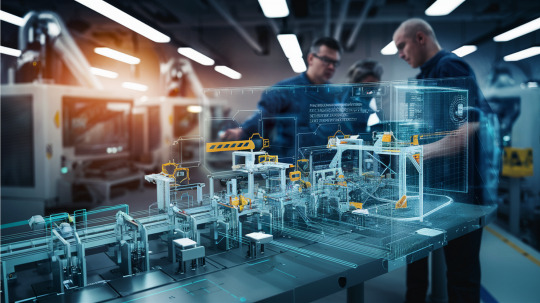
From optimizing production lines to streamlining supply chains, every facet of the manufacturing process is under constant scrutiny for enhancement. In this era of technological evolution, one technology has emerged as a beacon of efficiency: 3D visualization. Through its seamless integration into manufacturing workflows, 3D visualization has revolutionized the industry, offering unparalleled insights and capabilities that traditional methods simply cannot match.
At its core, 3D visualization enables the creation of lifelike digital representations of physical objects and environments. This technology has found widespread application across various industries, from architecture and gaming to healthcare and automotive. In the manufacturing sector, however, its impact is truly transformative.
By harnessing the power of 3D visualization, manufacturers can transcend the limitations of conventional 2D design methods. Complex components and assemblies can be rendered with astonishing detail and realism, providing engineers and designers with a comprehensive understanding of their creations. This newfound clarity eliminates ambiguity and ambiguity in the design phase, paving the way for more precise and efficient manufacturing processes.
One of the primary areas where 3D visualization excels is in design and prototyping. Traditional prototyping methods often involve time-consuming and costly processes, such as creating physical models or molds. With 3D visualization, however, these barriers are dismantled.
Manufacturers can rapidly iterate through design concepts, exploring different configurations and variations with ease. Digital prototypes can be manipulated and fine-tuned in real-time, allowing for quick validation of ideas and identification of potential issues. This iterative approach not only accelerates the product development cycle but also minimizes the risk of errors and rework downstream.
Beyond design and prototyping, 3D visualization plays a crucial role in production planning and simulation. Manufacturing facilities are complex ecosystems, comprising numerous interconnected processes and machines. Planning and optimizing these operations require a deep understanding of spatial relationships, material flows, and resource utilization.
With 3D visualization, manufacturers can create virtual replicas of their production environments, complete with machinery, conveyors, and storage facilities. By simulating various scenarios and workflows, they can identify bottlenecks, optimize layouts, and fine-tune operational parameters for maximum efficiency. This proactive approach enables manufacturers to anticipate challenges before they arise, minimizing downtime and maximizing throughput.
Furthermore, 3D visualization facilitates training and collaboration within manufacturing teams. Complex procedures and workflows can be difficult to convey through traditional training materials, such as manuals or presentations. With interactive 3D models, however, employees can immerse themselves in virtual environments, gaining hands-on experience without the need for physical equipment.
Moreover, 3D visualization fosters collaboration by providing a common platform for stakeholders across departments and locations. Engineers, designers, operators, and managers can collaborate in real-time, visualizing concepts and sharing feedback seamlessly. This interdisciplinary approach fosters innovation and continuous improvement, driving manufacturing efficiency to new heights.
As technology continues to advance, the role of 3D visualization in manufacturing will only become more prominent. Augmented reality (AR) and virtual reality (VR) technologies are already pushing the boundaries of what is possible, offering immersive experiences that blur the line between the physical and digital worlds.
In conclusion, 3D visualization is a game-changer for the manufacturing industry, offering unparalleled opportunities to enhance efficiency and productivity. By embracing this technology and integrating it into their workflows, manufacturers can unlock new levels of innovation and competitiveness in an increasingly dynamic and demanding market landscape.As manufacturers navigate the ever-changing landscape of digital transformation, partnering with experts in 3D modeling company services becomes paramount. Choose DevDen stands at the forefront of this evolution, offering specialized expertise in crafting immersive 3D models tailored to the unique needs of the manufacturing industry
#vr training solution#vr training#3d product modeling#xr development#xr development company#virtual reality#metaverse#augmented reality#mixed reality#ar development company
0 notes
Text
XR Development: A Complete Guide to Building Immersive Experiences

In the rapidly evolving world of digital transformation, XR development has become a cornerstone for delivering immersive, interactive, and impactful digital experiences. From training simulations and product visualization to virtual collaboration, Extended Reality (XR) is reshaping how we interact with the digital world. This guide explores the fundamentals of XR development, the vital role of XR developers, and how to choose the right XR development company to bring your vision to life.
What is XR Development?
Extended Reality (XR) is an umbrella term that includes Virtual Reality (VR), Augmented Reality (AR), and Mixed Reality (MR). XR development involves building digital environments and experiences that merge the physical and virtual worlds to enhance interactivity and engagement.
Whether it’s VR-based employee training, AR product demos, or MR design tools, XR development enables organizations to solve real-world problems through immersive technology.
Core Components of XR Development
To deliver a successful XR experience, XR developers work across multiple components:
Cross-Platform Deployment: Developing apps compatible across XR devices using engines like Unity or Unreal Engine.
Real-Time Rendering: Ensuring optimized graphics performance for immersive realism.
Why Businesses are Investing in XR Development
Companies across sectors are leveraging XR development to solve key challenges and unlock new opportunities:
Who Are XR Developers?
XR developers are specialized professionals who build applications that run on XR platforms. Their responsibilities include:
Programming using C#, C++, JavaScript, or Python depending on the project.
Building immersive apps with Unity, Unreal Engine, or WebXR frameworks.
Collaborating with designers and 3D artists to create seamless user experiences.
Integrating features such as motion tracking, physics, and AI-driven interactions.
Testing and optimizing across devices to ensure consistent performance. These developers are not just coders, they’re problem solvers, creative thinkers, and pioneers in the digital space.
How to Choose the Right XR Development Company
The success of an immersive project depends heavily on your XR development partner. Here’s what to consider when choosing an XR development company:
Choosing the right partner ensures that your investment delivers maximum ROI and real-world impact.
Trends Shaping the Future of XR Development
The XR space is rapidly evolving. Key trends include:
WebXR: Browser-based XR experiences accessible without installing apps. AI-Powered XR: Smart environments, adaptive learning, and AI-driven interactivity. Cloud XR: Streaming XR content from the cloud for lightweight devices. Digital Twins: Creating real-time virtual replicas of physical systems for industries like manufacturing and urban planning.
These innovations are expanding the scope of what’s possible in XR and reshaping how we work, train, and communicate.
Conclusion
XR development is no longer an emerging technology-it’s a transformative tool for businesses ready to embrace the future. From immersive learning environments to interactive design simulations, XR has the power to improve performance, increase efficiency, and open up new ways of engaging with both employees and customers. At DevDen, we specialize in building immersive XR solutions tailored to your business needs. As a trusted XR development company, our expert XR developers bring together design, technology, and industry insights to create interactive applications that deliver real value. Whether you need VR for training, AR for product engagement, or MR for real-time collaboration, DevDen is your go-to partner for end-to-end XR development.
#vr training solution#vr training#3d product modeling#mixed reality#virtual reality#metaverse#augmented reality#xr development#xr development company#ar development company
0 notes
Text
How Will VR Training Transform Automotive Trainings and Maintenance?
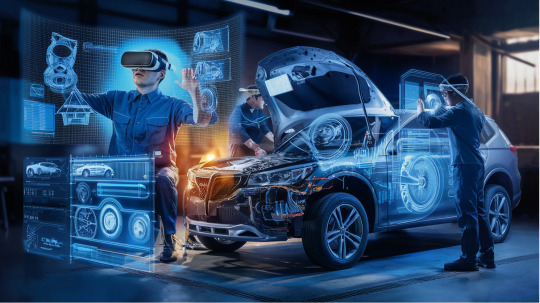
In the fast-evolving landscape of automotive technology, virtual reality (VR) and augmented reality (AR) stand poised to revolutionize the way professionals are trained and how maintenance tasks are carried out. As these immersive technologies become more accessible and advanced, their integration into automotive training and maintenance procedures holds the promise of enhancing efficiency, safety, and effectiveness across the industry.
One of the most significant advantages of VR/AR in automotive training lies in their ability to create immersive learning experiences. Traditional training methods often involve textbooks, lectures, and hands-on practice on real vehicles. While these methods are effective to a certain extent, they may fall short in providing comprehensive understanding and practical skills development.
VR trainings offers trainees the opportunity to interact with virtual automotive systems in a realistic environment without the risk of damage to vehicles or equipment. Trainees can explore the intricacies of engine components, electrical systems, and diagnostic procedures in a simulated setting. AR, on the other hand, overlays digital information onto the physical world, allowing trainees to receive real-time guidance and instructions while working on actual vehicles.
By immersing trainees in lifelike scenarios, VR and AR training modules can accelerate learning curves, improve retention of information, and foster better decision-making skills. Moreover, these technologies can be tailored to specific training objectives and skill levels, catering to both novice technicians and experienced professionals.
In the realm of automotive maintenance, AR holds the potential to streamline workflows and enhance efficiency. Maintenance technicians often face complex tasks that require referencing technical manuals, schematics, and diagnostic procedures. Traditional methods of accessing this information, such as printed manuals or digital screens, can be cumbersome and time-consuming, leading to delays and errors in the maintenance process.
AR solutions address these challenges by overlaying relevant information directly onto the technician’s field of view through smart glasses or heads-up displays. Imagine a technician wearing AR glasses while performing a diagnostic check on an engine. As they inspect various components, relevant data, such as service manuals, diagnostic codes, and step-by-step instructions, are displayed in real-time, enabling the technician to work hands-free and with greater precision.
Furthermore, AR can facilitate remote assistance, allowing technicians to collaborate with experts located elsewhere in the world. Through live video feeds and AR annotations, remote experts can guide on-site technicians through complex repairs and troubleshooting procedures, reducing downtime and minimizing the need for expensive travel.
Beyond improving efficiency and effectiveness, the integration of VR/AR into automotive training and maintenance also has implications for safety and quality assurance. By providing trainees with realistic simulations of hazardous scenarios, VR training solution can instill safety protocols and emergency procedures in a controlled environment, minimizing the risk of accidents and injuries in real-world situations.”
Similarly, AR-enabled maintenance procedures can ensure that technicians adhere to standardized protocols and best practices, reducing the likelihood of errors and oversights. Digital overlays can highlight critical components, indicate proper torque specifications, and flag potential safety hazards, thereby enhancing the quality and reliability of maintenance work.
As VR/AR technologies continue to evolve and become more accessible, their impact on automotive training and maintenance is poised to grow significantly. From immersive training experiences that accelerate learning curves to augmented maintenance procedures that enhance efficiency and safety, these technologies hold the potential to revolutionize the automotive industry. However, realizing this potential will require collaboration between technology developers, automotive manufacturers, training institutions, and maintenance professionals. By embracing innovation and investing in the adoption of vr automotive training solutions, stakeholders can equip the workforce with the skills and tools needed to navigate the complexities of modern automotive technology, ensuring a safer, more efficient, and more sustainable future for the industry.
#augmented reality#metaverse#virtual reality#mixed reality#vr training solution#vr training#3d product modeling#xr development#xr development company#ar development company
0 notes
Text
Why VR Trainings Are a Game-Changer for Manufacturing Operations
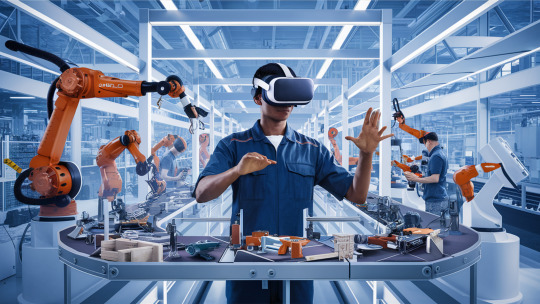
In the ever-evolving landscape of manufacturing, companies are constantly seeking innovative ways to enhance productivity, efficiency, and safety. One such groundbreaking solution is Virtual Reality training. By immersing employees in realistic, simulated environments, VR training offers unparalleled opportunities for skill development and safety training. Let’s explore how VR training is transforming the manufacturing industry.
Types of VR Training in Manufacturing
1. Safety Training
VR can simulate hazardous scenarios, allowing workers to practice safety protocols without real-world risks. This includes handling machinery, working in high-risk areas, and responding to emergencies. Employees can repeatedly practice their responses to potential accidents, ensuring they are well-prepared for any situation.
2. Equipment Handling:
Training employees on complex machinery can be costly and time-consuming. VR offers a cost-effective solution by providing hands-on experience with virtual models of equipment. Trainees can interact with detailed virtual replicas of machinery, learning operational procedures, troubleshooting, and maintenance without the risk of damaging expensive equipment.
3. Assembly Line Training:
VR can replicate assembly line processes, enabling workers to understand and master their roles before stepping onto the actual floor. This includes learning the sequence of operations, identifying potential bottlenecks, and practicing time management to optimize productivity.
4. Maintenance Training:
Technicians can learn to diagnose and repair machinery in a virtual environment, reducing downtime and improving efficiency. VR training can cover routine maintenance tasks, emergency repairs, and advanced diagnostics, ensuring technicians are well-equipped to handle any issue that arises.
Benefits of VR Training in Manufacturing
Enhanced Safety
VR training reduces workplace accidents by allowing employees to practice in a risk-free environment.
Cost-Effective:
It minimizes the need for physical resources and equipment for training purposes.
Improved Retention:
Interactive and immersive training experiences lead to better retention and understanding of skills.
Scalability:
Training solutions can be easily scaled and customized to suit the needs of different employees and departments.
Conclusion
The integration of VR training in manufacturing is revolutionizing the industry by providing a safe, efficient, and cost-effective method for training employees. As the technology continues to evolve, the possibilities for VR training are limitless. For any VR training solutions, contact DevDen, a leading VR development company, and unlock the full potential of your workforce with VR manufacturing training.
#augmented reality#metaverse#virtual reality#mixed reality#vr training solution#vr training#3d product modeling#xr development#xr development company#ar development company#ar app development#vr development company
0 notes
Text
How Can VR Training Enhance Safety and Efficiency in Mining?
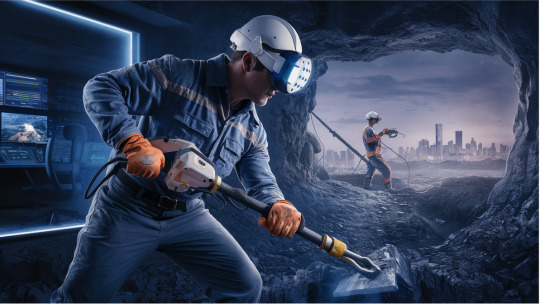
The mining industry is filled with inherent risks and challenges. Ensuring the safety and efficiency of mining operations is paramount. Virtual Reality (VR) training offers an innovative solution to these challenges, providing realistic and immersive training experiences that prepare workers for the complexities of mining.
Types of VR Training in Mining
1. Safety Drills:
Simulating emergency situations such as mine collapses, fire outbreaks, and equipment failures to train workers on proper response protocols. VR allows miners to practice emergency evacuation procedures, communication strategies, and first aid in a controlled environment.
2. Equipment Operation:
Training on the use of heavy machinery and specialized mining equipment in a controlled, virtual environment. VR mining trainings can simulate the operation of drills, loaders, and transport vehicles, allowing operators to gain confidence and proficiency before working with actual equipment.
3. Site Exploration:
Virtual tours of mining sites help workers familiarize themselves with the terrain and operational layout before entering the actual site. This training can include navigation of underground tunnels, understanding ventilation systems, and recognizing key landmarks for safety and efficiency.
4. Hazard Recognition:
Technicians can learn to diagnose and repair machinery in a virtual environment, reducing downtime and improving efficiency. VR training can cover routine maintenance tasks, emergency repairs, and advanced diagnostics, ensuring technicians are well-equipped to handle any issue that arises.
Benefits of VR Training in Mining
Risk Reduction:
VR training minimizes the risks associated with traditional training methods by providing a safe and controlled environment.
Cost Savings:
Reduces the need for physical resources and equipment, lowering training costs.
Enhanced Learning:
Immersive experiences lead to better comprehension and retention of safety procedures and operational skills.
Remote Accessibility
Training can be conducted remotely, making it accessible to workers in different locations.
Conclusion
The adoption of VR training in the mining industry is a game-changer, offering a safer, more efficient, and cost-effective way to train employees. By leveraging VR technology, mining companies can significantly enhance their training programs, ensuring workers are well-prepared for the challenges of the industry. For any VR training solutions, contact DevDen, a leading VR development company, and enhance safety protocols and improve overall efficiency with VR mining training tailored for the mining sector.
#vr training solution#vr training#3d product modeling#virtual reality#mixed reality#augmented reality#metaverse#xr development#xr development company#vr app development#vr development company
0 notes
Text
Why Your Company Needs VR Industrial Trainings for Workforce Development
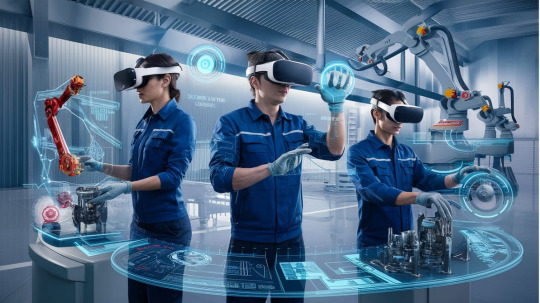
As industries evolve with advancing technology, the methods we use to train and develop our workforce must also adapt. Traditional training methods are no longer sufficient to meet the demands of today’s complex and high-risk industrial environments. Enter VR industrial training — a groundbreaking approach that offers immersive, hands-on learning experiences. In this blog, we’ll explore why VR industrial training is essential for workforce development and how they can benefit your company.
Revolutionizing Training with VR
1. Equipment Operation Training :
VR simulations allow employees to practice operating various types of machinery and equipment. This type of training is particularly useful for complex and potentially dangerous machinery, such as forklifts, cranes, and manufacturing robots. Workers can learn how to use these machines in a virtual environment before handling them in the real world.
2. Safety and Emergency Response Training :
Safety training is critical in industrial settings. VR can simulate emergency scenarios, such as fires, chemical spills, or equipment failures, allowing employees to practice emergency response procedures without real-world risks. This type of training ensures that workers are prepared to act quickly and effectively in case of an emergency.
3. Maintenance and Repair Training :
VR training can simulate the maintenance and repair of industrial equipment. Technicians can practice troubleshooting and fixing issues in a virtual environment, gaining hands-on experience without the need for physical equipment. This type of training helps reduce downtime and ensures that maintenance tasks are performed correctly.
4. Assembly and Production Line Training:
In manufacturing, VR can simulate assembly line processes, allowing employees to practice assembling products step-by-step. This type of training helps workers become familiar with the production process and improves their efficiency and accuracy on the job.
The Benefits of VR Industrial Training
Enhanced Safety and Risk Management :
VR training allows employees to practice safety protocols in a risk-free environment, reducing workplace accidents and injuries.
Improved Skill Retention and Performance :
Interactive VR training improves information retention and confidence by allowing repeated practice of complex tasks in a virtual setting.
Cost-Effective Training Solutions :
VR training cuts costs by eliminating physical materials, reducing travel expenses, and minimizing downtime, while lowering accident-related expenses.
Real-Time Feedback :
Employees receive instant feedback in VR training, enabling quick correction of mistakes and faster proficiency.
Conclusion
VR industrial training is more than just a trend — it’s a transformative approach to workforce development that offers unparalleled benefits in terms of safety, skill retention, cost-efficiency, and scalability. By integrating VR training into your company’s training programs, you can prepare your workforce for the complexities and challenges of modern industrial environments. Invest in VR training today and pave the way for a safer, more skilled, and more efficient workforce.For any VR training solutions, contact DevDen, a leading VR development company, and unlock the full potential of your employees with VR industrial training tailored to meet the unique challenges of your industry.
#vr training solution#vr training#mixed reality#3d product modeling#metaverse#augmented reality#virtual reality#xr development#xr development company#ar development company
0 notes
Text
How Can Virtual Reality Solutions Transform Your Business?
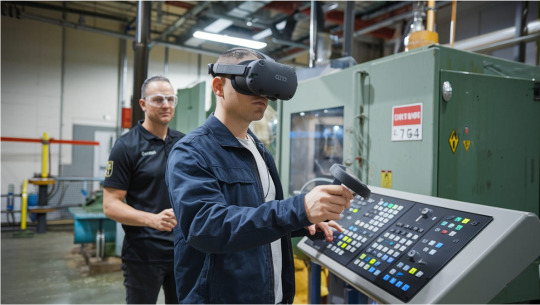
In today’s fast-paced digital world, businesses are constantly seeking innovative ways to stay ahead of the competition. One such groundbreaking technology that has the potential to revolutionize various industries is Virtual Reality (VR). From enhancing customer experiences to streamlining internal processes, VR solutions are becoming increasingly vital for modern businesses. In this blog post, we will explore how VR App development can transform your business and propel it to new heights.
One of the most significant benefits of VR development is its ability to create immersive and engaging customer experiences. Businesses can leverage VR to offer virtual tours, interactive product demonstrations, and even virtual try-on experiences. For instance, real estate companies can provide virtual property tours, allowing potential buyers to explore homes without physically visiting them. Similarly, fashion retailers can use VR to enable customers to try on clothes virtually, improving the online shopping experience.
Employee training is a critical aspect of any business, and VR trainings can take it to the next level. VR development enables the creation of realistic training simulations that can prepare employees for various scenarios without the risks associated with real-life training. For example, in the healthcare industry, medical professionals can practice surgeries in a virtual environment before performing them on actual patients. This not only enhances their skills but also reduces the likelihood of errors.
In an increasingly globalized world, businesses often have teams spread across different locations. VR solutions can facilitate better collaboration by creating virtual meeting spaces where team members can interact as if they were in the same room. This can lead to more effective communication, brainstorming sessions, and decision-making processes. Moreover, VR development can integrate with other collaboration tools, making it easier to share documents, presentations, and other resources in real time.
VR offers unique opportunities for marketing and branding efforts. By creating immersive and memorable experiences, businesses can capture the attention of their target audience and leave a lasting impression. For example, automotive companies can offer virtual test drives, allowing potential customers to experience the thrill of driving a new car from the comfort of their homes. Additionally, VR can be used for experiential marketing campaigns, where customers can interact with a brand in a virtual environment, fostering a deeper connection.
VR development can streamline the product design and prototyping process. Designers and engineers can create virtual prototypes and test them in a simulated environment, identifying potential issues and making necessary adjustments before moving to physical production. This not only saves time and resources but also accelerates the product development cycle. Industries such as automotive, aerospace, and consumer electronics can greatly benefit from this approach, as it allows for more efficient and cost-effective innovation.
Sales presentations are crucial for closing deals, and VR can make them more impactful. Sales teams can use VR to showcase products or services in a more engaging and interactive manner. For example, a furniture company can create virtual showrooms where potential customers can visualize how different pieces of furniture would look in their homes. This immersive experience can help customers make more informed decisions, ultimately boosting sales. Virtual Reality (VR) stands poised to revolutionize businesses by enhancing customer engagement, improving training methods, fostering collaboration, boosting marketing efforts, expediting product development, optimizing sales strategies, and streamlining operations. For tailored VR solutions that cater to diverse business needs across industries, explore the innovative services offered by DevDen vr development company. Their expertise ensures cutting-edge implementations that leverage VR’s transformative power to drive success and innovation in your business ventures.
#xr development company#xr development#3d product modeling#vr training solution#vr training#mixed reality#virtual reality#augmented reality#metaverse
0 notes
Text
From Rig to Refinery: The Impact of VR Trainings in Oil & Gas — AR VR Development Company in India
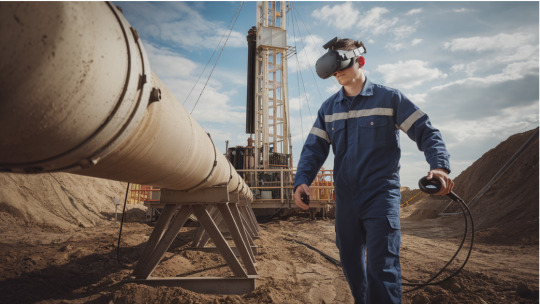
The oil and gas industry operates in some of the most challenging and hazardous environments. Ensuring the safety and competency of workers is crucial. VR app development provides an innovative approach to training in the oil and gas sector, offering immersive experiences that prepare employees for real-world scenarios.
Types of VR Training in Oil & Gas
1. Emergency Response:
Simulating scenarios such as oil spills, gas leaks, and explosions to train workers on effective emergency response. VR training includes drills for fire suppression, evacuation procedures, and communication strategies, ensuring that employees can act swiftly and effectively in emergencies.
2. Equipment Handling:
Training on the operation and maintenance of drilling rigs, pipelines, and other specialized equipment. VR simulations provide a detailed understanding of equipment functionalities, safety protocols, and maintenance procedures, reducing the risk of operational errors.
3. Offshore Drilling:
Virtual simulations of offshore drilling operations help workers understand the complexities and safety protocols involved. This includes training on platform operations, emergency evacuations, and environmental protection measures, preparing workers for the unique challenges of offshore environments.
4. Hazard Identification:
Practicing the identification and mitigation of potential hazards in a controlled, virtual environment. VR can simulate various risk scenarios, such as blowouts, equipment failures, and environmental hazards, teaching workers to recognize and respond to threats proactively.
Benefits of VR Training in Oil & Gas
Safety Enhancement:
Reduces the risk of accidents by providing a safe environment for training on hazardous scenarios.
Cost Efficiency:
Lowers training costs by minimizing the need for physical resources and equipment.
Improved Skill Retention:
Interactive and immersive experiences lead to better retention and understanding of procedures and skills.
Scalability :
raining can be conducted remotely, making it accessible to workers in different locations.
Conclusion
VR training is revolutionizing the oil and gas industry by providing a safer, more efficient, and cost-effective method for training employees. By adopting VR technology, companies can ensure their workforce is well-prepared to handle the complexities and risks associated with the industry.
For any VR training solutions, contact DevDen, a leading VR development company, and enhance safety protocols and improve overall efficiency
Originally published at https://www.devdensolutions.com on August 27, 2024.
— AR VR Development Company in India | Augmented Reality | Virtual Reality
The oil and gas industry operates in some of the most challenging and hazardous environments. Ensuring the safety and competency of workers is crucial. VR app development provides an innovative approach to training in the oil and gas sector, offering immersive experiences that prepare employees for real-world scenarios.
Types of VR Training in Oil & Gas
1. Emergency Response:
Simulating scenarios such as oil spills, gas leaks, and explosions to train workers on effective emergency response. VR training includes drills for fire suppression, evacuation procedures, and communication strategies, ensuring that employees can act swiftly and effectively in emergencies.
2. Equipment Handling:
Training on the operation and maintenance of drilling rigs, pipelines, and other specialized equipment. VR simulations provide a detailed understanding of equipment functionalities, safety protocols, and maintenance procedures, reducing the risk of operational errors.
3. Offshore Drilling:
Virtual simulations of offshore drilling operations help workers understand the complexities and safety protocols involved. This includes training on platform operations, emergency evacuations, and environmental protection measures, preparing workers for the unique challenges of offshore environments.
4. Hazard Identification:
Practicing the identification and mitigation of potential hazards in a controlled, virtual environment. VR can simulate various risk scenarios, such as blowouts, equipment failures, and environmental hazards, teaching workers to recognize and respond to threats proactively.
Benefits of VR Training in Oil & Gas
Safety Enhancement:
Reduces the risk of accidents by providing a safe environment for training on hazardous scenarios.
Cost Efficiency:
Lowers training costs by minimizing the need for physical resources and equipment.
Improved Skill Retention:
Interactive and immersive experiences lead to better retention and understanding of procedures and skills.
Scalability :
raining can be conducted remotely, making it accessible to workers in different locations.
Conclusion
VR training is revolutionizing the oil and gas industry by providing a safer, more efficient, and cost-effective method for training employees. By adopting VR technology, companies can ensure their workforce is well-prepared to handle the complexities and risks associated with the industry.
For any VR training solutions, contact DevDen, a leading VR development company, and enhance safety protocols and improve overall efficiency
#augmented reality#vr training#vr training solution#mixed reality#virtual reality#metaverse#xr development#xr development company#3d product modeling
0 notes
Text
How VR Training Accelerates Upskilling & Reskilling in the Automotive Sector
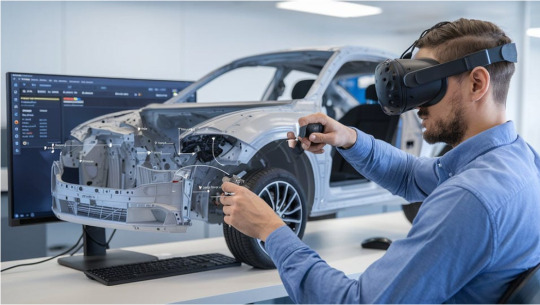
The automotive industry is evolving rapidly, driven by technological advancements, shifting consumer demands, and sustainability efforts. As a result, the need for upskilling and reskilling the workforce has never been more critical. Virtual Reality (VR) training solutions offer a powerful way to meet these demands, providing immersive, hands-on learning experiences that accelerate skill acquisition and keep automotive professionals ahead of the curve.
The Growing Need for Upskilling & Reskilling in the Automotive Industry
utomotive manufacturing has seen a wave of innovation with the rise of electric vehicles (EVs), automation, and smart technologies. This shift demands that workers develop new competencies in handling complex machinery, assembly processes, and digital systems. Upskilling refers to teaching employees new, advanced skills to enhance their current roles, while reskilling focuses on preparing them for entirely new job functions within the industry.
To remain competitive, companies need to ensure their workforce is adaptable and proficient in these emerging technologies. Traditional training methods often struggle to keep pace with these developments, leading to significant knowledge gaps. That’s where VR automotive training steps in, offering cutting-edge, efficient learning experiences.
How VR Training Solutions Enhance Learning
Unlike conventional training approaches, VR training solutions create immersive environments where learners can practice new tasks in real-world scenarios without the risks or constraints of physical spaces. This technology allows employees to train on complex assembly processes, vehicle diagnostics, and safety protocols in a virtual, yet lifelike environment.
1. Hands-On Experience in a Risk-Free Environment
VR trainings offer interactive simulations where users can perform tasks like assembling vehicle components, running diagnostics, and testing machinery-all without real-world consequences. This risk-free environment is ideal for reskilling workers, particularly those transitioning into new roles, allowing them to gain confidence without fear of error.
2. Customizable Learning Paths
One of the most significant benefits of VR automotive training is the ability to customize training programs based on the needs of the learner. For instance, experienced workers can receive targeted upskilling on specific areas like electric vehicle maintenance, while new employees can undergo comprehensive training across multiple processes. VR solutions are adaptable, ensuring that each trainee receives the exact knowledge required to excel.
3. Accelerated Learning Through Immersion
The immersive nature of VR enhances retention and understanding. Studies show that learners in virtual environments absorb information more quickly than in traditional classroom settings, thanks to their active engagement in realistic scenarios. For automotive professionals, VR trainings simulate tasks such as assembly, quality control, and troubleshooting in real-time, dramatically speeding up the learning curve.
Upskilling & Reskilling Through Real-World Simulations
One of the biggest challenges of reskilling workers in the automotive industry is recreating the complexities of the manufacturing process. Traditional training methods often fall short, providing either static learning materials or outdated software. In contrast, VR automotive training uses real-world simulations that replicate actual job tasks.
Workers can practice repairing engines, assembling electrical systems, or calibrating machinery, gaining practical experience that prepares them for real-life challenges. Moreover, these VR training solutions can be integrated with remote collaboration tools, allowing teams across different locations to learn together and exchange expertise.
Cost-Effectiveness and Scalability of VR Trainings
Automotive companies are under constant pressure to reduce costs while maintaining productivity. VR training is a cost-effective solution that eliminates the need for physical equipment, dedicated training spaces, and on-site instructors. Trainees can access VR training solutions anywhere, reducing downtime and eliminating travel costs for large-scale training sessions.
Moreover, VR trainings are highly scalable. Once developed, training modules can be rolled out across multiple facilities, ensuring consistency and accessibility. Whether a company is reskilling hundreds of employees or providing specialized upskilling to a small group, VR solutions are flexible enough to meet those demands without breaking the budget.
A Future-Proof Approach to Workforce Development
As the automotive sector continues to evolve, so too must its workforce. By adopting VR automotive training, companies can future-proof their talent by ensuring their employees have the skills needed to thrive in a high-tech, competitive industry. The benefits of VR trainings-customization, scalability, cost-effectiveness, and immersive learning-make it an indispensable tool for driving efficiency, improving employee performance, and preparing the workforce for tomorrow’s challenges.
Conclusion
In conclusion, VR training solutions are transforming the way automotive professionals upskill and reskill, offering them practical experience in a safe and engaging environment. By leveraging these technologies, automotive companies can stay ahead of industry trends while empowering their workforce to master complex tasks faster and more effectively than ever before.
For comprehensive VR training solutions, reach out to DevDen, VR training company specialized in AR/VR/MR and 3D immersive technologies. DevDen provides tailored, industry-specific VR training programs designed to enhance workforce skills and drive operational efficiency.
#augmented reality#xr development company#xr development#vr training#vr training solution#virtual reality#ar development company
0 notes
Text
Enhance Prototyping & Production: The Impact of VR on Automotive Training and Design

In today’s rapidly evolving automotive industry, Virtual Reality (VR) is revolutionizing both prototyping and production processes. From concept design to workforce training, VR provides innovative solutions that streamline operations, reduce costs, and accelerate learning. In this blog, we’ll explore how VR automotive training, is shaping the future of automotive design and production.
As the automotive industry becomes more technologically advanced, the need for skilled workers grows. VR automotive training offers immersive learning experiences that help employees quickly adapt to new tools, processes, and machinery.
VR training solutions are easily scalable and customizable. Whether it’s training new hires or upskilling experienced workers, VR offers flexible modules that can be tailored to specific needs, from EV assembly to automated manufacturing systems.
By integrating VR into both prototyping and training processes, automotive companies can create a seamless connection between design and production. Workers trained using VR are better equipped to handle the complexities of modern manufacturing, particularly in areas such as electric vehicle production and automation.
For example, during the transition to electric vehicles, both prototyping and production teams need to collaborate closely to meet safety and performance standards. VR facilitates this collaboration, ensuring smooth transitions between design and production.
VR is transforming automotive prototyping and training, offering solutions that accelerate design iterations, enhance workforce skills, and streamline production processes. Automotive companies adopting VR training solutions are better positioned to meet the demands of an increasingly competitive market.
For customized VR solutions in automotive design and training, contact DevDen, a vr development company in AR/VR/MR and 3D immersive technologies. DevDen provides industry-specific programs to drive innovation and operational excellence.
#augmented reality#metaverse#mixed reality#xr development#xr development company#vr training solution#virtual reality#vr training#3d product modeling
0 notes
Text
Transforming Manufacturing with AR: How Augmented Reality Boosts Efficiency and Reduces Downtime — AR VR Development Company in India | Augmented Reality | Virtual Reality

Augmented Reality (AR) is revolutionizing the manufacturing industry, transforming the way processes are managed and tasks are performed. By overlaying digital information onto the physical world, AR enables manufacturers to optimize operations, increase productivity, and minimize downtime. This article explores how AR app development and VR training are enhancing efficiency in manufacturing and the benefits they bring to the table.
The Role of AR in Manufacturing
AR technology leverages digital content such as 3D models, animations, and real-time data to provide workers with critical information while performing tasks. With the integration of AR, workers can visualize complex machinery, view step-by-step instructions, and receive real-time guidance, leading to fewer errors and faster problem resolution.
AR development has expanded to include various industrial applications such as maintenance, assembly, quality assurance, and training. When combined with VR training, manufacturers can provide immersive learning experiences, ensuring employees gain practical skills in a controlled virtual environment before they engage with real-world equipment.
Key Ways AR Boosts Manufacturing Efficiency 1. Enhanced Maintenance and Troubleshooting
AR can significantly improve maintenance processes by enabling technicians to view machine data, maintenance history, and troubleshooting guides overlaid onto the actual equipment. Through AR app development, solutions can be designed that allow workers to diagnose and repair equipment more quickly, leading to reduced downtime. This is especially valuable in high-stakes manufacturing environments where delays can have a significant financial impact.
2. Improved Assembly and Production Processes
AR guides can be used to assist workers during complex assembly tasks. Visual instructions overlaid onto the assembly line help ensure each step is performed correctly, reducing the likelihood of errors. As a result, the time taken to assemble products is shortened, and the need for rework is minimized. Furthermore, AR-enabled quality control systems can detect defects or deviations in real time, ensuring that production standards are consistently met.
3.Efficient Training with AR and VR Integration
Combining AR with VR training solutions enhances the learning experience for manufacturing employees. AR allows workers to train on actual equipment with visual aids, while VR immerses them in a simulated environment to practice scenarios that may be hazardous or complex. Together, they provide a comprehensive training solution that accelerates learning curves and improves retention, equipping workers with the skills they need to perform their jobs more safely and efficiently.
4. Remote Assistance and Collaboration
AR app development can facilitate remote support by enabling experts to view equipment through a worker’s AR device and provide real-time guidance. This reduces the need for on-site visits, saving time and travel costs. Additionally, VR-based remote collaboration tools allow teams to work together seamlessly despite being located in different parts of the world, further enhancing productivity and decision-making.
Reducing Downtime with AR
Manufacturers face significant costs when production comes to a halt due to equipment failures or maintenance issues. AR helps minimize downtime by streamlining maintenance, improving troubleshooting accuracy, and enabling faster decision-making. Here are some ways in which AR development reduces downtime:
1. Real-Time Monitoring and Alerts
With AR, equipment can be equipped with sensors that provide real-time performance data. If a machine starts to show signs of wear or deviation from optimal performance, workers receive instant alerts and visual indicators of the problem’s location. This proactive approach to maintenance can help prevent equipment failures before they occur.
2. On-the-Job Guidance and Instructions
AR apps can deliver step-by-step instructions and 3D visualizations directly to workers’ devices. This allows less experienced technicians to perform maintenance tasks they may not be familiar with, as the AR guidance reduces the learning curve and enhances their ability to execute tasks accurately.
3. Predictive Maintenance Integration
AR development can incorporate predictive maintenance strategies that analyze data from sensors to predict when equipment will require servicing. By scheduling maintenance during planned downtimes, manufacturers can avoid unexpected disruptions and keep operations running smoothly.
The Future of AR in Manufacturing
As AR technology continues to evolve, its potential in manufacturing will only expand. With ongoing advancements in AR app development and the integration of AI and IoT, manufacturers can look forward to even more intelligent and adaptive solutions that further boost efficiency and reduce downtime. Combining AR with VR training provides an all-encompassing approach to workforce development, ensuring that employees are better equipped to handle the challenges of modern manufacturing.
Conclusion
AR is driving significant transformations in the manufacturing industry, enabling companies to achieve higher efficiency and reduce downtime. Through AR app development and the integration of VR training, manufacturers can equip their workforce with the tools and skills needed to excel in today’s competitive landscape. Embracing these cutting-edge technologies will not only boost productivity but also position manufacturers at the forefront of innovation, setting the stage for a more resilient and future-ready industry.By adopting AR solutions now, manufacturers can stay ahead of the curve and reap the long-term benefits of enhanced operational efficiency and reduced downtime. For specialized AR/VR /3D solutions, contact DevDen, an expert AR app development company dedicated to transforming industries with immersive technologies.
#augmented reality#metaverse#mixed reality#3d product modeling#vr training solution#virtual reality#vr training#xr development#xr development company
0 notes
Text
How Augmented Reality is Elevating Marketing Campaigns with Immersive Brand Experiences
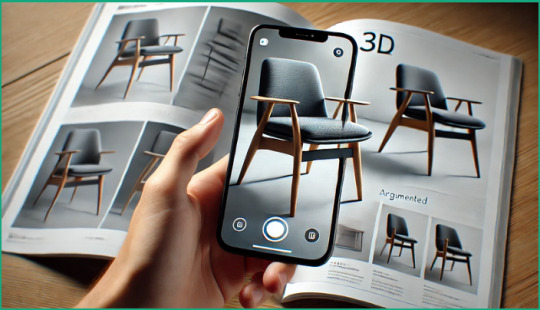
The marketing landscape has seen a significant shift in recent years, with brands increasingly turning to innovative technologies to engage their audiences. Among these, Augmented Reality (AR) stands out as a transformative tool that is reshaping how companies connect with consumers. By integrating digital elements into the physical world, AR enables businesses to deliver immersive brand experiences that go far beyond traditional advertising methods. In this blog, we'll explore how AR is elevating marketing campaigns and why AR app development is becoming a crucial part of brand strategies today.
What is Augmented Reality?
Augmented Reality is a technology that overlays digital content—such as images, videos, and 3D models—onto the real world, viewed through devices like smartphones, tablets, or AR glasses. Unlike Virtual Reality (VR), which creates an entirely virtual environment, AR enhances the user's perception of their surroundings by adding digital components. This blend of physical and digital experiences makes AR a powerful tool for marketing, enabling brands to interact with customers in ways that were previously impossible.
The Role of AR App Development in Marketing
AR app development is a vital part of modern marketing strategies because it enables brands to craft unique, interactive experiences for their audiences. Through AR development, companies can create customized applications that allow consumers to engage with products and services in dynamic ways. Here’s how AR is reshaping marketing campaigns:
Interactive Product DemosAR allows consumers to visualize and interact with products in a highly realistic manner. For instance, furniture retailers can offer AR apps that let customers see how a piece of furniture would look and fit in their living space before making a purchase. This interactive experience not only boosts consumer confidence but also shortens the buying cycle by eliminating guesswork.
Enhanced Print and Digital MediaAR is breathing new life into traditional print media. Magazines, brochures, and even business cards can come to life with AR-enabled content, such as videos, 3D animations, or clickable links. By simply scanning a printed material with an AR app, consumers can access additional information, promotional offers, or virtual experiences, thereby turning static content into interactive marketing tools.
Immersive Brand StorytellingStorytelling has always been at the core of successful marketing campaigns. AR development takes storytelling to the next level by allowing brands to create immersive narratives that engage all senses. Whether it’s through an AR game, a virtual tour, or an interactive character that guides users, brands can foster deeper emotional connections with their audiences.
Virtual Try-OnsOne of the most popular applications of AR in marketing is virtual try-ons. Fashion brands and cosmetic companies are using AR apps that enable customers to "try on" clothes, accessories, or makeup virtually. This not only enhances the shopping experience but also reduces product returns, as customers have a better understanding of how items will look before purchasing.
Location-Based AR ExperiencesAR technology can be used to create location-specific experiences, such as scavenger hunts or guided tours. These experiences encourage users to engage with the brand in physical spaces while interacting with digital content that’s relevant to the location. Such campaigns can drive foot traffic to stores or events and create memorable, shareable experiences for participants.
Why Brands are Investing in AR Development
The benefits of AR app development extend beyond just creating captivating marketing campaigns. Here’s why more businesses are incorporating AR into their strategies:
Increased Engagement: AR apps offer a more engaging experience compared to traditional ads or static digital content. They encourage users to interact with the brand, resulting in longer engagement times and higher conversion rates.
Data Collection and Personalization: AR apps can track user interactions, providing valuable insights into consumer preferences and behaviors. This data can be used to personalize marketing efforts, ensuring that content resonates more effectively with target audiences.
Differentiation from Competitors: As AR development becomes more accessible, early adopters can gain a competitive edge by offering unique, tech-driven experiences that set them apart in the market.
Conclusion
Augmented Reality is no longer just a futuristic concept; it’s a powerful marketing tool that’s transforming how brands engage with consumers. By investing in AR development, companies can deliver immersive, interactive experiences that resonate with their audiences, drive higher engagement, and foster brand loyalty. As AR technology continues to mature, the potential for more creative and effective marketing campaigns will only expand, making now the perfect time to explore the possibilities of AR app development.
Embrace the future of marketing with AR—elevate your campaigns, engage your customers, and leave a lasting impression with immersive brand experiences. Contact DevDen , an AR app development company specializing in AR/VR 3D solutions, to start creating cutting-edge AR experiences for your brand today.
#ar app development#xr development#xr development company#virtual reality#metaverse#vr training#vr training solution#augmented reality#mixed reality
0 notes
Text
Virtual Reality in Heavy Machinery Training: Reducing Errors in Mining Operations

Mining operations are among the most demanding and high-stakes industries, where precision and safety are paramount. Errors in operating heavy machinery not only compromise productivity but also pose significant risks to worker safety and equipment longevity. Enter VR training—a revolutionary approach to equipping workers with the skills and experience they need without the risks of real-world training.
In this blog, we’ll explore how VR training simulations are transforming heavy machinery training in mining, reducing errors, and ensuring optimal operational efficiency.
The Challenges in Mining Machinery Training
Training operators for heavy machinery in mining environments comes with numerous challenges:
High Stakes: Mistakes during training can result in damage to expensive equipment or dangerous accidents.
Limited Access to Equipment: Downtime for training purposes can disrupt mining operations and lead to revenue loss.
Environmental Factors: Harsh conditions in mining sites make on-the-job training logistically and physically challenging.
These barriers make traditional training methods costly, inefficient, and sometimes impractical. This is where VR training steps in as a game-changer.
How VR Training Revolutionizes Heavy Machinery Operations
Virtual reality offers an immersive and interactive learning environment, simulating real-world scenarios with unmatched accuracy. Here’s how VR training simulations are reducing errors in mining machinery operations:
1. Risk-Free Learning Environment
Operators can practice controlling heavy machinery in realistic mining scenarios without any risk of accidents or damage to equipment. This ensures workers can learn from their mistakes in a safe, controlled environment.
2. Enhanced Skill Retention
Studies show that immersive training experiences improve information retention by engaging multiple senses. Trainees develop muscle memory and decision-making skills that translate seamlessly into real-world performance.
3. Cost Efficiency
By reducing the need for physical resources and downtime, VR training solutions lower operational costs while still delivering high-quality, practical learning experiences.
4. Real-Time Performance Analytics
Advanced VR systems provide detailed feedback and analytics on trainee performance, helping instructors identify skill gaps and tailor training programs accordingly.
5. Scalable Training Programs
VR simulations can be adapted for multiple types of heavy machinery and customized to match specific operational challenges of a mining site, making them versatile and scalable.
Applications of VR Training in Mining Operations
The versatility of VR training solutions enables its use across a range of mining operations, including:
Excavator Operations: Trainees learn how to maneuver large excavators with precision, minimizing errors in earthmoving and loading tasks.
Drill Rig Training: Operators can practice drilling techniques in various geological conditions, reducing the risk of equipment failure.
Haul Truck Navigation: VR simulations help drivers navigate tight spaces and challenging terrains with confidence.
Emergency Response Drills: Workers can rehearse protocols for hazardous situations like equipment malfunctions or mine collapses.
Conclusion
The integration of VR training simulations into heavy machinery training in mining is transforming how operators are prepared for their roles. By offering a risk-free, cost-effective, and highly immersive learning environment, VR is minimizing human errors and ensuring safer, more efficient operations.
If you’re considering adopting VR training solutions for your mining operations, partner with experts like DevDen. As leaders in AR/VR 3D solutions, DevDen can help you design customized training programs that meet the unique demands of your industry.
Ready to revolutionize your training approach? Explore the possibilities with VR today
#augmented reality#vr training solution#vr training#virtual reality#mixed reality#metaverse#xr development
0 notes
Text
Improving Quality Control: VR Training for Inspection Processes in Automotive Manufacturing
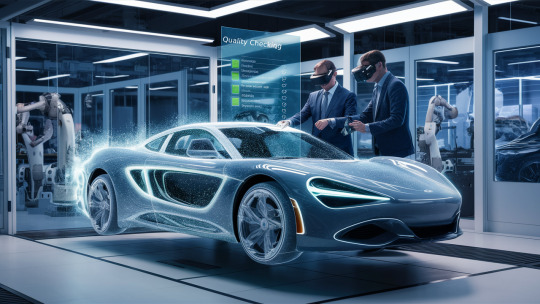
In automotive manufacturing, quality control is a critical pillar for ensuring safety, reliability, and customer satisfaction. As production methods evolve, so do the demands for precision in inspection processes. To meet these needs, VR training solutions are revolutionizing how manufacturers train their teams. Through immersive simulations and hands-on virtual environments, VR training is enhancing efficiency, accuracy, and consistency in inspection processes.
Why Quality Control Demands Innovation
Quality control in automotive manufacturing involves rigorous inspections of components, assemblies, and finished vehicles. Traditional training methods often rely on repetitive manual practice, which can be time-consuming, costly, and prone to human error. These limitations highlight the need for VR training solutions, which provide controlled, replicable environments for real-world scenarios.
How VR Training Enhances Inspection Processes
1. Simulated Inspection ScenariosVR training simulations replicate real-world inspection conditions, enabling trainees to identify defects in components such as engine parts, body panels, or electrical systems. The virtual environment immerses users, allowing them to detect issues like misalignments, surface defects, and material inconsistencies without risking actual production downtime.
2. Error-Free Training in a Controlled Environment Unlike physical training, VR training solutions create a risk-free environment where errors can be made and corrected without real-world consequences. Trainees can practice complex inspection techniques repeatedly, ensuring they master the skills needed for accurate quality checks.
3. Enhancing Decision-Making SkillsThrough dynamic VR training simulations, trainees face varying scenarios, such as detecting multiple defect types or deciding on corrective actions. This fosters quick and informed decision-making, a crucial ability in maintaining production quality standards.
4. Real-Time Feedback for Continuous ImprovementVR training platforms integrate analytics to track trainee performance. Metrics such as time taken to inspect, accuracy in identifying defects, and areas requiring improvement are readily available. Real-time feedback ensures that learning is tailored and effective.
Benefits of VR Training for Automotive Quality Control
1. Faster Onboarding of Employees New hires can quickly familiarize themselves with inspection processes through interactive VR training modules. The immersive nature of VR makes it easier to grasp complex procedures, reducing onboarding time significantly.
2. Cost Savings on ResourcesTraditional training often requires dedicated machinery, raw materials, and significant downtime. VR training eliminates these costs by providing digital replicas of inspection tools and environments.
3. Standardized Training Across TeamsWith VR training, every employee receives the same high-quality instruction, ensuring uniformity in skill levels and reducing variability in quality inspections.
4. Improved Employee Confidence and CompetencePracticing in a virtual setting builds confidence. Employees gain hands-on experience without the fear of making critical mistakes on actual production lines.
Conclusion Incorporating VR training into quality control processes is a game-changer for automotive manufacturing. It equips employees with the skills and confidence to excel in inspection tasks, ensuring that every vehicle leaving the production line meets rigorous standards.
DevDen, a leader in VR development company, specializes in creating tailored VR training programs for automotive and other industries. Let us help you redefine your inspection processes and achieve excellence in quality control.
Contact us today to learn more about our VR training solutions!
0 notes
Text
Training for Precision: The Benefits of VR for Quality Assurance in Manufacturing
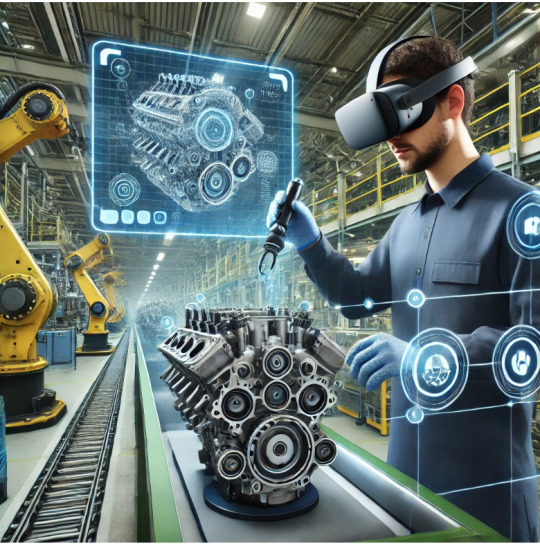
In the manufacturing industry, precision is key. A slight deviation in quality can result in defective products, wasted resources, and lost customer trust. This is where VR training comes into play. Leveraging virtual reality technology, companies can enhance quality assurance (QA) processes, improve workforce skills, and ensure consistency in production standards.
The Role of VR Training in Quality Assurance
Quality assurance requires meticulous attention to detail, consistency, and a deep understanding of production standards. Traditional training methods, such as classroom sessions or on-site mentoring, often struggle to deliver hands-on experience without the risk of damaging equipment or wasting materials.
VR training bridges this gap by providing immersive, risk-free environments where employees can learn and practice QA procedures. From detecting product defects to mastering the use of precision tools, VR training ensures employees are well-prepared before stepping onto the shop floor.
Key Benefits of VR Training Simulations for QA in Manufacturing
1. Enhanced Skill Development
Using VR training simulations, workers can interact with virtual models of machinery and products. They can practice identifying faults, performing inspections, or calibrating instruments with real-time feedback. This hands-on learning experience boosts skill retention and accelerates proficiency.
2. Standardized Training Across Teams
Manufacturing facilities often have multiple teams working across different shifts or locations. VR training solutions provide standardized content, ensuring all employees receive the same level of training, regardless of their location. This uniformity reduces variability and enhances overall QA processes.
3. Error Reduction
Mistakes in QA can lead to costly recalls or production halts. VR simulations allow employees to repeatedly practice complex QA tasks in a virtual environment until they perfect them. This reduces on-the-job errors and ensures higher accuracy in inspections.
4. Cost-Efficient Training
Traditional QA training often involves downtime, material wastage, and instructor fees. By adopting VR training solutions, companies can cut these costs while delivering highly effective, scalable training programs.
5. Real-Time Data and Analytics
One of the standout features of VR training is its ability to track employee performance in real time. Analytics from training sessions highlight areas where workers excel and areas that need improvement, enabling tailored training approaches.
Conclusion
In the quest for precision and quality, VR training emerges as a powerful tool for manufacturing industries. By providing immersive, scalable, and cost-effective training environments, virtual reality equips employees with the skills and confidence to excel in quality assurance.
With companies like DevDen leading the way in creating innovative vr development, the adoption of VR training is set to redefine standards in manufacturing QA. It’s time to embrace this cutting-edge technology to ensure precision, enhance productivity, and stay ahead in the competitive manufacturing landscape.
#3d product modeling#vr training solution#vr training#mixed reality#virtual reality#metaverse#augmented reality
0 notes